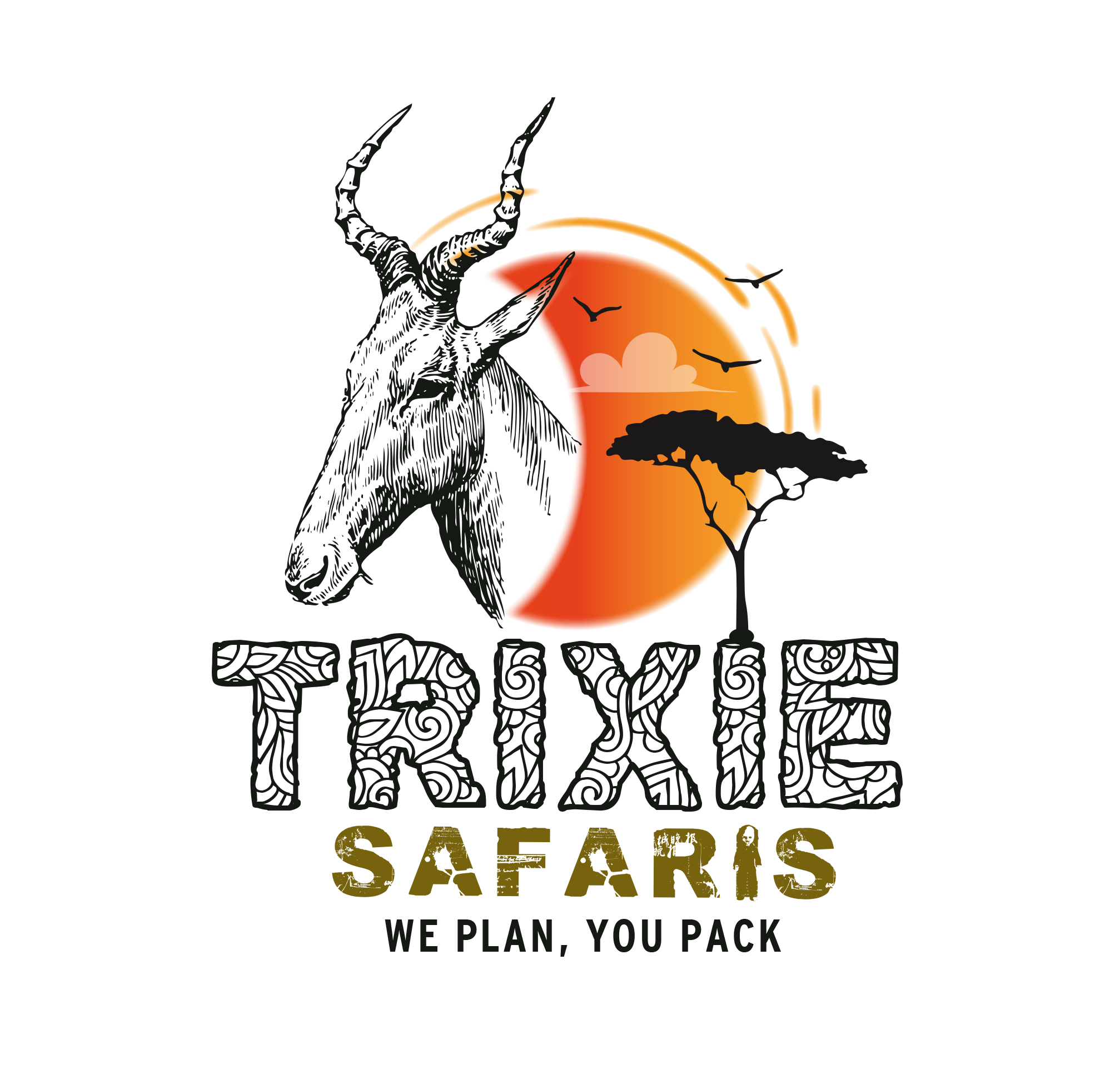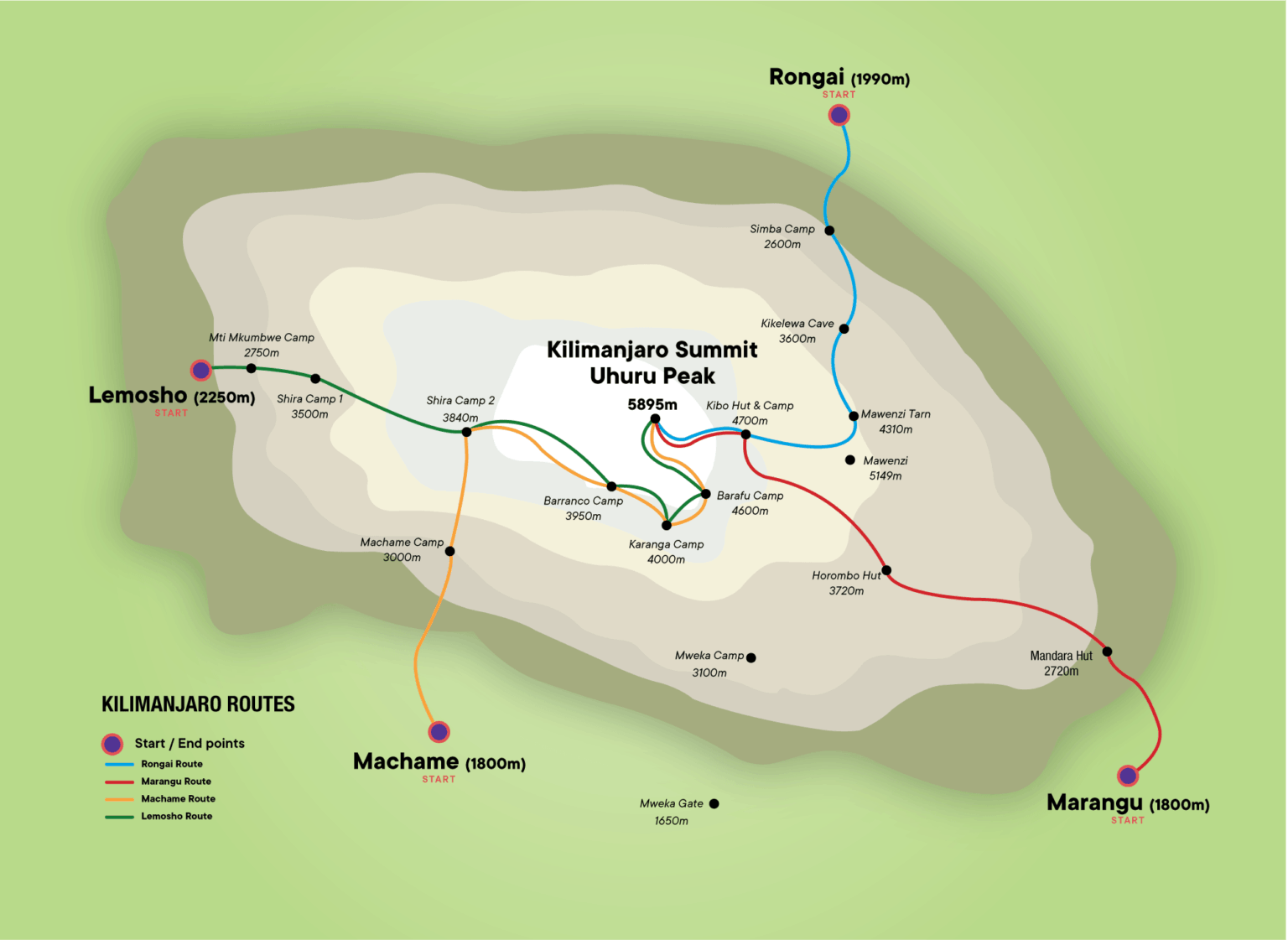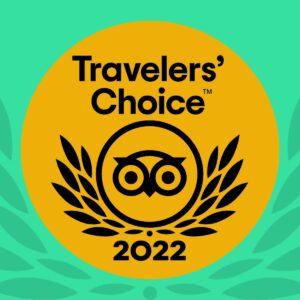5 Days Marangu Route
- Home
- Itineraries
- 5 Days Marangu Route
Introduction
Known as the “Coca-Cola” route, the Marangu route is a classic trek on Mount Kilimanjaro. It is the oldest, most well-established route. Many favour the Marangu route because it is considered to be the easiest path on the mountain, given its gradual slope. It is also the only route which offers sleeping huts in dormitory-style accommodations.
The minimum days required for this route is five, although the probability of successfully reaching the top in that time period is quite low. Spending an extra acclimatization day on the mountain is highly recommended when climbing Kilimanjaro using the Marangu route.
However, despite its immense popularity, we avoid leading climbs on the Marangu route. The route has the least scenic variety of all the routes because the ascent and descent are done on the same path and it is the most crowded route for that reason. Marangu is favoured only during the rainy season, where the hut accommodations are preferred
Day 0: Pre-trek Briefing
If you have opted for the optional airport transfers, we will pick you up from Kilimanjaro Airport or Arusha airport and transfer you to your hotel in Moshi.
Pre-trek briefing at your Moshi hotel. You should be planning to arrive atleast one day before the start of the trek. Today we will spend in having a pre-trek briefing. We will also review your equipment and rent any equipment which is needed.
Day 1: Hotel to Mandara Hut
After breakfast and briefing, drive to the Kilimanjaro National Park Gate (about 1 hour), register and commence the climb. Walk through the rainforest to the Mandara encampment. A side trip to Maundi Crater is a good way to see the surroundings including Northern Tanzania and Kenya. In the rainforest, look for towering Eucalyptus trees, bird life, and Colobus monkeys.
Elevation: 1860m/6100ft to 2700m/8875ft
Distance: 8km/5mi
Hiking Time: 3-4 hours
Habitat: Montane Forest
Meals: Lunch and Dinner
Day 2: Mandara Hut to Horombo Hut
You leave the glades of the rain-forest and follow an ascending path on the open moorlands to the Horombo encampment. Views of Mawenzi and the summit of Kibo are amazing. Look for giant lobelias and grounsels. You may begin to feel the affects of the altitude.
Elevation: 2700m/8875ft to 3700m/12,200ft
Distance: 12km/7.5mi
Hiking Time: 5-6 hours
Habitat: Heathland
Meals: Breakfast, Lunch and Dinner
Day 3: Horombo Hut to Kibo Hut
Ascending, we now pass the last watering point, walking onto the saddle of Kilimanjaro between the peaks of Kibo and Mawenzi. Vegetation begins with upper heathland but then disappears into “moonscape”. Dinner, rest, and prepare for summit climb.
Elevation: 3700m/12,200ft to 4700m/15,500ft
Distance: 9km/5.5mi
Hiking Time: 5-6 hours
Habitat: Alpine Desert
Meals: Breakfast, Lunch and Dinner
Day 4: Kibo Hut to Summit to Horombo Hut
Very early in the morning (midnight to 2 am), commence the climb to the summit on steep and heavy scree or snow up to Gilman’s point located on the crater rim. Continuing, we now ascend to Uhuru Peak, which is the highest point in Africa. There are unbelievable views at every turn. Have your picture taken at the summit to show your friends and family. From here we descend, stopping for lunch and a rest at Kibo before continuing on to the Horombo encampment.
Elevation: 4700m/15,500ft to 5895m/19,340ft
Down to 3700m/12,200ft
Distance: 6km/4mi up / 15km/9mi down
Hiking Time: 6-8 hours up / 15km/9mi down
Habitat: Alpine Desert
Meals: Breakfast, Lunch and Dinner
Day 5: Horombo Hut to Moshi
After breakfast, a steady descent takes us down through moorland to the Mandara Hut. Continue descending through lush forest path to the National Park gate at Marangu. At lower elevations, it can be wet and muddy. Gaiters and trekking poles will help. Shorts and t-shirts will probably be plenty to wear (keep rain gear and warmer clothing handy).
A vehicle will be waiting for you at Marangu gate to drive you back to your hotel in Moshi (about 1 hour).
Elevation: 3700m/12,200ft to 1700m/5500ft
Distance: 20km/12.5mi
Hiking Time: 4-5 hours
Habitat: Forest
Meals: Breakfast
Included
- Private transport to and from Kilimanjaro International Airport to your accommodations in Moshi
- 2 nights’ accommodation in Moshi in full board (Weruweru River Lodge or Park View Hotel)
- Transportation to and from the Kilimanjaro gate
- Park entry fees
- Camping fees
- Crater fee (if applicable)
- Kilimanjaro Rescue fees
- 18% VAT on tour fees and services
- Four-season mountain tents
- Double-layered sleeping mats (4 inches / 10cm thick)
- Friendly and professional mountain guides, cook, and porters
- Three meals daily while on the mountain
- Sufficient treated and filtered drinking water throughout the trek
- Hot water for washing
- Fair wages for the mountain crew as per Kilimanjaro National Park Authority (KINAPA) and Kilimanjaro Association of Tour Operators (KIATO) standards
- Government taxes
- Portable oxygen tanks
- Ox meter
- Emergency first-aid kit
- Stethoscope
- Portable flush toilet with tent
- Mountain climbing certificates
Excluded
- Drinks at your hotel before and after the climb
- Travel insurance
- Flights
- Laundry (available at the hotel)
- Personal items and toiletries
- Tips for guides, porters, and cook
Mount Kilimanjaro is located in Tanzania, East Africa. It is the highest peak in Africa and the highest free-standing mountain in the world.
The highest peak is Uhuru Peak, standing at 5,895 meters (19,341 feet) above sea level.
The best time is during the dry season, from late June to October and January to mid-March, for stable weather conditions.
It takes 5-9 days on average, depending on the route and pace.
The altitude is 5,895 meters (19,341 feet) at its highest point.
Kilimanjaro offers several trekking routes to the summit, each with its unique challenges and scenic views. The most popular routes are:
- Marangu Route (also known as the “Coca-Cola Route”): Easiest, with hut accommodations.
- Machame Route (the “Whiskey Route”): Challenging but scenic.
- Lemosho Route: Longer, allowing for better acclimatization.
- Rongai Route: Quieter and more remote.
- Umbwe Route: The steepest and most direct, recommended for experienced trekkers.


